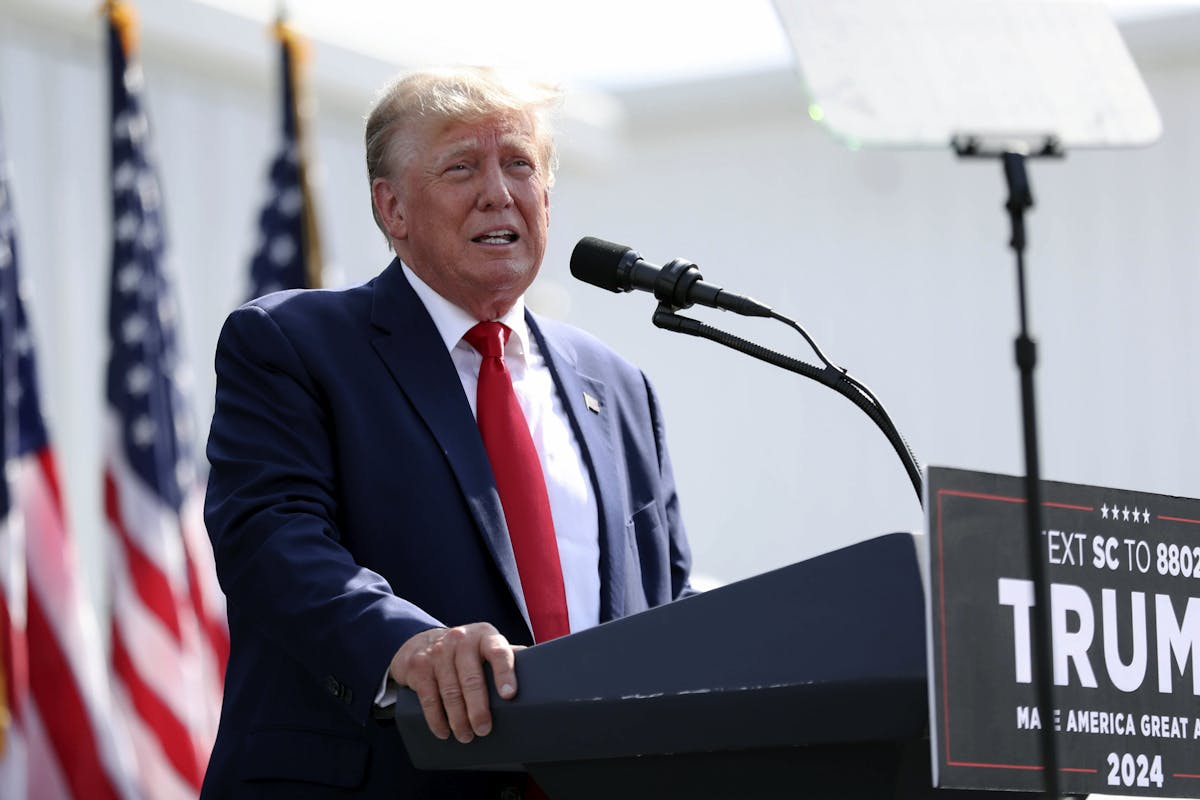For a Post-Trump GOP, Texas Looks Much More Competitive: Poll
A new survey finds that, a year out, President Trump is the only Republican with a significant lead in the Lone Star State.

A new survey of Texas voters indicates that President Trump is the only Republican candidate with a significant lead against President Biden a year out from the election. It’s also raising questions about the potential role of spoiler candidates in the Lone Star State.
A survey from the Texas Politics Project at the University of Texas at Austin found that Mr. Trump leads Mr. Biden 45 percent to 37 percent in the state. Another 13 percent said they’d vote for “someone else,” and 5 percent said they hadn’t considered the issue.
Mr. Trump is, however, the only Republican candidate leading Mr. Biden by a margin larger than the poll’s 2.83-point margin of error. Governor DeSantis is the only other candidate who leads Mr. Biden, 39 percent to 38 percent.
Businessman Vivek Ramaswamy trails Mr. Biden 33 percent to 36 percent, Ambassador Nikki Haley trails the president 32 percent to 34 percent, Senator Scott trails 33 percent to 34 percent, and Vice President Pence trails 36 percent to 39 percent.
The survey’s findings suggest that, despite Republicans investing significant time and money into trying to find a candidate who is not Mr. Trump, he might be the most electable candidate in the field, at least in Texas.
The pollster identified relatively low support for non-Trump Republicans among GOP voters as a reason for other candidates’ unfavorable polling numbers against Mr. Biden, who is himself not popular in Texas.
In their analysis, the pollsters write that “among Republicans, support for their potential standard bearer ranges from 83 percent for Trump to 52 percent for Pence, with the lower polling candidates all receiving less than 61 percent of GOP support with the exception of DeSantis, who receives 74 percent support.”
At the same time, Mr. Trump also elicited significant opposition from within his own party, with 38 percent of respondents who said they plan to vote in the GOP primary saying they “would definitely not support Trump.”
Governor Christie and Mr. Pence were the only candidates who elicited more opposition from within their party, with 46 percent saying they would not support Mr. Christie and 42 percent saying they would not back Mr. Pence. Mr. Ramaswamy was the next highest at 23 percent opposition among Republican respondents.
The director of the Texas Politics Project, Jim Henson, says that he expects many of the Republicans who say they would not support Mr. Trump in the primary to “come home” to the Republican Party no matter the nominee.
Mr. Henson says he expects negative partisanship — the tendency for voters to vote against a candidate or party they don’t like rather than for a candidate or party they do like — to define much of the 2024 election.
“It’d be hard to overemphasize how important negative partisanship is in Texas,” Mr. Henson tells the Sun. “I do suspect that most Republicans will ‘come home.’”
Mr. Henson credits some of the relatively low polling numbers for non-Trump Republicans to the fact that they’re not as well known as Mr. Trump. He did note, though, that Texas is becoming more competitive statewide and could become genuinely competitive in a cycle where Democrats have a more popular nominee and Mr. Trump is no longer on the ballot.
“Yes the state is becoming more competitive but it’s becoming more competitive more slowly than Democrats would like,” Mr. Henson said. “You have to take into account the advantage Republicans have in controlling the state’s rules around how elections are conducted.”
One factor that the poll did not account for, but which could make Texas more competitive in 2024, is the presence of a third-party or independent spoiler candidate on the ballot.
With No Labels promising to put forth a candidate — likely a Republican — in November, with philosopher Cornel West and attorney Robert Kennedy Jr. running as independents, and with the expected candidates from the Green and Libertarian parties, there will probably be at least five alternative choices for voters in 2024.
In the matchup between Messrs. Biden and Trump, the proportion of people who selected “someone else” was relatively evenly split between Republican and Democratic voters. Mr. Henson says he expects the specific politics of each candidate to affect this.
“That ‘someone else’ is kind of the Jesus candidate in the sense that people are free to imagine their ideal alternative instead of a real alternative,” Mr. Henson tells the Sun.
Mr. Kennedy, for example, is much more popular among Republicans than he is among Democrats, with an August Texas Politics Project survey finding that Republicans have a 24-point net positive view of Mr. Kennedy. Democrats, on the other hand, have a 19-point net negative view of Mr. Kennedy.
“Based on what we’ve seen so far, I think Texas looks a lot like the national numbers in the general pattern of Robert F. Kennedy Jr. playing better among Republicans than Democrats,” Mr. Henson says.

